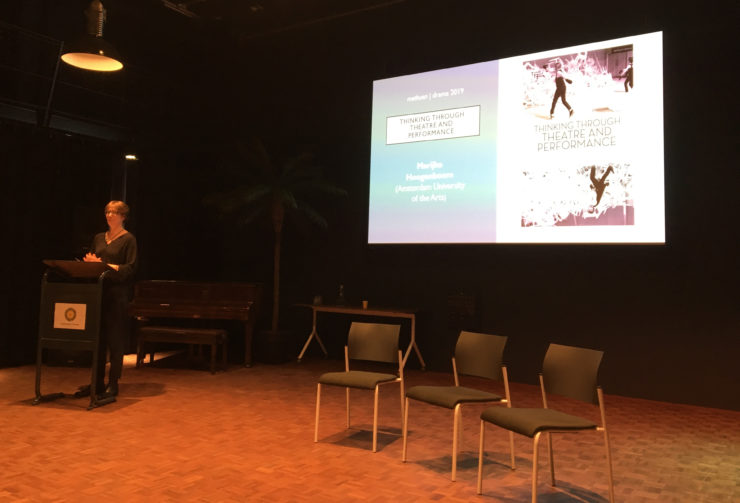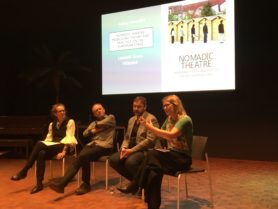Event Responses
“Questions struggling to be asked” – Ieva Pranckūnaitė
On the 16th of May, 2019, the first two volumes of the new book series Thinking Through Theatre were launched: Thinking Through Theatre and Performance, edited by Joe Kelleher (Roehampton University, London), Adrian Kear (University of the Arts, London), Heike Roms (University of Exeter, UK) and Maaike Bleeker (Utrecht University) and Nomadic Theatre: Mobilizing Theory and Practice on the European Stage by Liesbeth Groot Nibbelink (Utrecht University). The books were presented by their authors and editors as well as by other professionals from the fields of theatre and performance, namely by Marijn de Langen (Academy of Theatre and Dance/Mime School) and Marijke Hoogenboom (Academy of Theatre and Dance/DAS Graduate School), who shared their responses to the volumes.
Thinking Through Theatre and Performance is an innovative approach to writing about theatre and performance – it is a collection of chapters, written by different international scholars, which, in Kelleher’s words, is aimed towards students, seeks to be used by students. Volume’s editors, including Kelleher, Kear, and Bleeker, rely on their lecturing expertise and start their chapters with orienting questions that come up during the processes of teaching, researching or observing students. Thinking Through Theatre and Performance does not theorize or suggest specific answers to these orienting questions but instead dives deep into a set of problematic concepts, extensive analyses of case studies and a vast variety of possible answers to newly emerged questions. Kelleher even concludes that this book is more of a collection of academic essays, rather than book chapters.

Marijke Hoogenboom
In that sense, everyone who reads this volume is a student, who takes a position of critically thinking along and agrees to take part in the journey of trying to find out how theatre and performance studies can provide a helpful lens of looking at fundamental questions of artistic, social, political (and etc.) phenomena. In this way Thinking Through Theatre and Performance invites its readers to test situations and limits, remake and rethink concepts, invent new ways of being and creating not only in the contexts of theatre and performance, but also in expanded and intertwined fields of other academic debates.
Nomadic Theatre: Mobilizing Theory and Practice on the European Stage is an embodied philosophical trip, as concluded by Langen. This book, as well as Thinking Through Theatre and Performance, is rather based on exploring orienting questions than claiming certain academic answers. Instead of making abstract theoretical conclusions, Groot Nibbelink asks herself questions about particular performances – she investigates what are these performances really about, how are they moving forward, what are they moving towards, what are they doing to the artists, the audience and the space. In this way the author of the book listens to different performances and moves along with them, thinks through her own and other spectators’ experiences, experiments and plays around with different theoretical concepts from widely acclaimed theorists and authors (for example, Gilles Deleuze and Félix Guattari), reflects on the artistic and social movements and links them to global topics and issues, such as ecology. Nomadic Theatre: Mobilizing Theory and Practice on the European Stage provides some space for flexibility and changeability for seeing theatre and performance and looking at the world through them. As Langen has beautifully summed up, this book is about us navigating through the world, it’s about our disorientation moments at times and us trying to find out how and where to move from these moments.

From left to right: Maaike Bleeker, Joe Kelleher, Adrian Kear, and Liesbeth Groot Nibbelink
During the presentation of the volumes, a very beautiful thought was expressed by Liesbeth Groot Nibbelink, as she quoted the idea of Christopher Bollas (from the book Travelling Concepts by Mieke Bal): “I often find that although I am working on an idea without knowing exactly what it is I think, I am engaged in thinking an idea struggling to have me think it”. This quote seemed to be perfectly representative, not only when thinking about the content of the books presented, but also when analyzing the dramaturgy of the presentation itself. As well as both books, oriented towards the questions that need to be raised but not around the answers to them, the presentation seemed to be seeking to ask even more questions, to point out what else is there to be thought about in the contexts of theatre and performance and to invite fellow professionals from the field, as well as students, to link different personal experiences with different artistic (theatrical/performative) practices. The presentation was very informative, highly contemplative and educative, especially during the first part, when the speakers were talking about their experiences and thoughts. During the second part, when the responses for the books were shared, the presentation became very personal and in a sense familiar (yet still on a professional level), it invited the audience to question theatre, performance and the world together with the editors and the authors of the volumes. The book launch was suggesting several different starting points on the question of how to see different practices through the lens of theatre and provided with some new space for personal mental explorations of this question.
Ieva Pranckūnaitė is currently a Master’s degree student of Contemporary Theatre, Dance and Dramaturgy study programme at Utrecht University. She wrote this response to Thinking Through Theatre book launch as a part of her practical research internship.
*The photos were courtesy of Laura Karreman.

